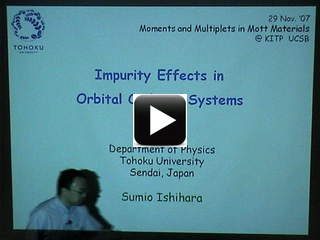I will talk about mainly the following two topics:
[1] Dilution effects on the long-range ordered state of the doubly degenerate eg orbital are investigated. Quenched impurities without the orbital degree of freedom are introduced in the orbital model where the long-range order is realized by the order-from-disorder mechanism. It is shown by Monte Carlo simulations and the cluster-expansion method that a decrease in the orbital-ordering temperature by dilution is substantially larger than that in the randomly diluted spin models. Tilting of orbital pseudospins around impurities is the essence of this dilution effect. The present theory provides a new viewpoint for the recent resonant x-ray scattering experiments in KCu1xZnxF3.[ PPL 95, 267204 (2005)]
[2] Interacting orbital degrees of freedom in a Mott insulator are essentially directional and frustrated. In
this Letter, the effect of dilution in a quantum-orbital system with this kind of interaction is studied by
analyzing a minimal orbital model which we call the two-dimensional quantum compass model. We find
that the decrease of the ordering temperature due to dilution is stronger than that in spin models, but it is
also much weaker than that of the classical model. The difference between the classical and the quantumorbital
systems arises from the enhancement of the effective dimensionality due to quantum fluctuations.[PRL 98, 256402 (2007)]
 Other video options
Other video options
To begin viewing slides, click on the first slide below. (Or, view as pdf.)
![[01]](tn/01.gif)
![[02]](tn/02.gif)
![[03]](tn/03.gif)
![[04]](tn/04.gif)
![[05]](tn/05.gif)
![[06]](tn/06.gif)
![[07]](tn/07.gif)
![[08]](tn/08.gif)
![[09]](tn/09.gif)
![[10]](tn/10.gif)
![[11]](tn/11.gif)
![[12]](tn/12.gif)
![[13]](tn/13.gif)
![[14]](tn/14.gif)
![[15]](tn/15.gif)
![[16]](tn/16.gif)
![[17]](tn/17.gif)
![[18]](tn/18.gif)
![[19]](tn/19.gif)
![[20]](tn/20.gif)
![[21]](tn/21.gif)
![[22]](tn/22.gif)
![[23]](tn/23.gif)
![[24]](tn/24.gif)
![[25]](tn/25.gif)
![[26]](tn/26.gif)
![[27]](tn/27.gif)
![[28]](tn/28.gif)
![[29]](tn/29.gif)
![[30]](tn/30.gif)
![[31]](tn/31.gif)
![[32]](tn/32.gif)
![[33]](tn/33.gif)
![[34]](tn/34.gif)
![[35]](tn/35.gif)
![[36]](tn/36.gif)
![[37]](tn/37.gif)
![[38]](tn/38.gif)
![[39]](tn/39.gif)
![[40]](tn/40.gif)
![[41]](tn/41.gif)
![[42]](tn/42.gif)
![[43]](tn/43.gif)
![[44]](tn/44.gif)
![[45]](tn/45.gif)